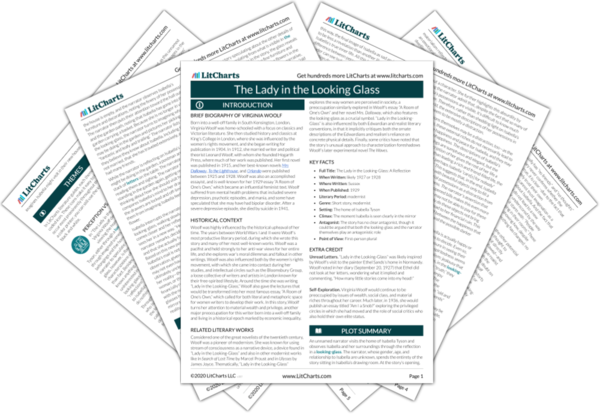The Narrator Quotes in The Lady in the Looking Glass
People should not leave looking-glasses hanging in their rooms any more than they should leave open cheque books or letters confessing some hideous crime. One could not help looking, that summer afternoon, in the long glass that hung outside in the hall.
But, outside, the looking-glass reflected the hall table, the sun-flowers, the garden path so accurately and so fixedly that they seemed held there in their reality unescapably.
Such comparisons are worse than idle and superficial—they are cruel even, for they come like the convolvulus itself trembling between one’s eyes and the truth. There must be truth; there must be a wall.
And, whether it was fancy or not, they seemed to have become not merely a handful of casual letters but to be tablets graven with eternal truth—if one could read them, one would know everything there was to be known about Isabella, yes, and about life, too.
If she concealed so much and knew so much one must prize her open with the first tool that came to hand—the imagination.
It was her profounder state of being that one wanted to catch and turn to words, the state that is to the mind what breathing is to the body, what one calls happiness or unhappiness.
At once the looking-glass began to pour over her a light that seemed to fix her; that seemed like some acid to bite off the unessential and superficial and to leave only the truth. It was an enthralling spectacle.
People should not leave looking-glasses hanging in their rooms.

The Narrator Quotes in The Lady in the Looking Glass
People should not leave looking-glasses hanging in their rooms any more than they should leave open cheque books or letters confessing some hideous crime. One could not help looking, that summer afternoon, in the long glass that hung outside in the hall.
But, outside, the looking-glass reflected the hall table, the sun-flowers, the garden path so accurately and so fixedly that they seemed held there in their reality unescapably.
Such comparisons are worse than idle and superficial—they are cruel even, for they come like the convolvulus itself trembling between one’s eyes and the truth. There must be truth; there must be a wall.
And, whether it was fancy or not, they seemed to have become not merely a handful of casual letters but to be tablets graven with eternal truth—if one could read them, one would know everything there was to be known about Isabella, yes, and about life, too.
If she concealed so much and knew so much one must prize her open with the first tool that came to hand—the imagination.
It was her profounder state of being that one wanted to catch and turn to words, the state that is to the mind what breathing is to the body, what one calls happiness or unhappiness.
At once the looking-glass began to pour over her a light that seemed to fix her; that seemed like some acid to bite off the unessential and superficial and to leave only the truth. It was an enthralling spectacle.
People should not leave looking-glasses hanging in their rooms.











